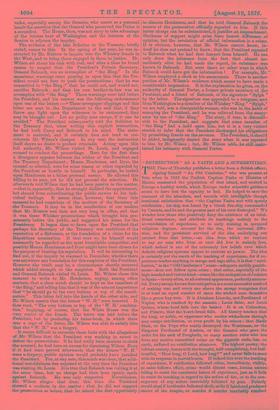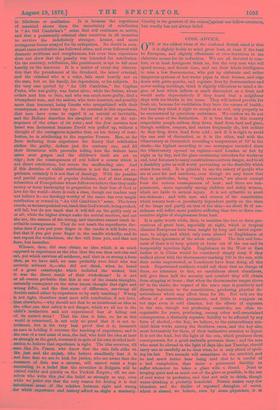"RETRIBUTION" AS A FAITH AND A SUPERSTITION.
THE Times of Thursday publishes a letter from a British officer, signing himself "An Old Cambrian," who was present at Scio when in 1822 the Turkish Capitan Pasha or Minister of Marine massacred the population of that island, and excited in Europe a healthy wrath, which Europe under scientific guidance seems to have lost the capacity to feel. He helped to save the remnant of the islanders, and records with intelligible though irrational satisfaction that "the Capitan Pasha met with speedy retribution ; his ship was burnt by a Greek fire-ship commanded by Canaria, and he and the greater part of his crew destroyed." We wonder how those who positively deny the existence of an intui- tional conscience, and attribute its teachings entirely to the accumulation of experience, or to early training in invented religious dogmas, account for the rise, the universal diffu- sion, and the persistent survival of the idea underlying our extract from that letter,—an idea from which we venture to say no man who lives or ever did live is entirely free, which indeed is one of the extremely few beliefs over which definite religious systems appear to exercise no power. The idea is certainly not the result of the teaching of experience, for if ex- perience teaches anything to savage and sage alike, it is that " retri- bution," in the "Old Cambrian's " sense—adequate earthly punish- ment—does not follow upon crime ; that crime, especially of the high,handed and violent kind—crime like the extirpation of Judaism in Spain—is very often, to all outward appearance, perfectly success- ful. Every savage knows that extirpation is a most successful method of making war, and every one above the savage recognises that in at least an equal number of cases the wicked man flourishes like a green bay-tree. It is Abraham Lincoln, not Ferdinand of Naples, who is reached by the assnsnin ; Louis Seize, not Louis Quinze, whose head falls into the basket. It is on Columbus, not Pizarro, that the heart-break falls. All history teaches that the king, or noble, or oppressor who carries wickedness through may escape retribution, or even profit by his crimes ; that Nadir Shah, or the Pope who nearly destroyed the Waldenses, or the Emperor Ferdinand of Austria, or the General who gave the order for the sack of Drogheda, or many another ruler who has from any motive committed crime on the gigantic scale, has, on earth, suffered no retribution whatever. The highest poetry, the loftiest oratory, burns with the thought, half-complaining, but half- trustful, "How long, 0 Lord, how long?" and never fails to meet with its response in mortal hearts. If indeed this were the teaching of experience, if retribution followed crime, immediately, visibly, as cause follows effect, crime would almost cease, human nature - failing to resist the consistent lesson of experience, just as it fails to resist its teaching in regard to the action of fire, or to the con- sequence of any action invariably followed by pain. Nobody would steal if toothache followed theft, or lie if falsehood produced cancer of the tongue, or murder if murder inevitably resulted
in blindness or mutilation. It is because the experience of mankind shows them the uncertainty of retribution in "An Old Cambrian's " sense that evil continues so active, and that a persistently criminal class contrives in all countries to survive the indefinitely stronger, keener, and more courageous forces arrayed for its extirpation. No doubt in occa- sional cases retribution has followed crime, and even followed with dramatic swiftness and completeness, but even then experience does not show that the penalty was intended for retribution. On the contrary, retribution, like punishment, is apt to fall most heavily on the innocent. It is a matter of every-day observa- tion that the punishment of the drunkard, the minor criminal, and the criminal who is a ruler, falls most heavily not on the man, but on his family, his dependants, or his subjects. In the very case quoted by "An Old Cambrian," the Capitan Pasha, who was guilty, was burnt alive ; while the Sultan, whose orders sent him to Scio, and who was much more guilty, died a triumphant man, and the sailors, who were innocent, and possibly more than innocent, being Greeks who sympathised with their -countrymen, were burnt up too. So constant is this experience, that men have come to regard it as natural or inevitable, and the Hellene describes the slaughter of a city as the con- sequence of the crime of its ruler ; and the Jew narrates how Israel was decimated because David was puffed up, without a thought of the outrageous injustice that, on his theory of retri- bution, he is attributing to the superior Powers. Men, so far from deducing from experience the theory that retribution strikes the guilty, deduce just the contrary one, and fill their literatures with proverbs telling how the fathers have -eaten sour grapes and the children's teeth are set on edge ; how the consequences of evil follow a course which is not direct retribution, but covers the unoffending also. And if this doctrine of visible retribution is not the lesson of ex- perience, certainly it is not that of theology. With the possible and partial exception of popular Judaism, and of that strange subsection of Evangelicism whose followers believe that they make money or incur bankruptcy in proportion to their fear of God or love for the world—there is such a class, though our readers may not believe it—no theology worthy of the name has ever taught retribution or reward in "An Old Cambrian's" sense. The lower .creeds, as we have pointed out, teach that God's wrath, being evoked, will fall, but do not teach that it will fall on the guilty only or at all; while the higher always make the mental emotion, and not the act, the essence of the wrong, and therefore cannot teach in- evitable consequences. They do not teach the superfluous doc- trine that if you put your finger in the candle it will balm you, but that if you put your finger in the candle wickedly, and do not repent the wickedness, the-fire will burn you, and that not here, but hereafter.
Whence, then, did men obtain an idea which is as much -opposed to experience as the idea that the sun does not rise and set, yet which survives all evidence, and that in so strong a form that, as we have said, no man probably ever lived who was entirely without it,—who did not think, when he heard -of a great catastrophe which included the wicked, that it was the direct result of their wickedness? Is it not ot all events probable that this is one of the innate thoughts, naturally consequent on the other innate thought that right and wrong differ, and like that sense of difference, surviving all Aoubts raised either by experience or by early teaching? Wrong is not right, therefore must meet with retribution, if not here, then elsewhere,—why should not that be as intuitional an idea as the other one that safety is not danger, which we all see in the child's instinctive and not experienced fear of falling out of its nurse's arms ? That the idea is false, so far as this world is concerned, is not only no proof that it is not in- tuitional, but is the very best proof that it is, inasmuch -as man in holding it reverses the teaching of experience, and in the case of a vast mass of men, the bad, who hold the idea at least -as ,strongly as the good, reverses it in spite of his own decided incli- nation to believe that experience is right. The idea survives, till 4nen like Dr. Fraser, who know that the rain falls alike on the just and the unjust, who believe steadfastly that it is not here that we are to look for justice, who are aware that the massacre of Scio was a success, still cannot resist a hope amounting to a belief that the atrocities in Bulgaria will be visited visibly and quickly on the Turkish Empire ; till we our- selves who write this feel the belief as strongly as any, even while we point out that the only reason for feeling it is that intuitional sense of the relation between right and wrong for winch experience and history afford so slight a warranty. ' Cruelty is the greatest of the crimes:against our fellow-creatures, but cruelty has not always failed.































 Previous page
Previous page